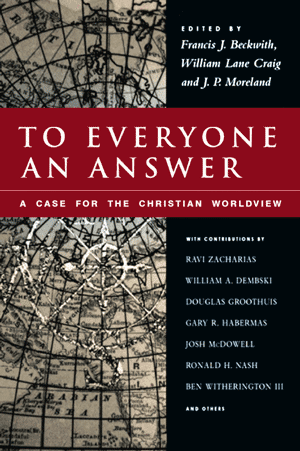To Everyone an Answer: A Case for the Christian Worldview
 Francis J. Beckwith, William Lane Craig, and J. P. Moreland, eds., To Everyone an Answer: A Case for the Christian Worldview (Downer’s Grove: InterVarsity Press, 2004), 396 pages, ISBN 9780830827350.
Francis J. Beckwith, William Lane Craig, and J. P. Moreland, eds., To Everyone an Answer: A Case for the Christian Worldview (Downer’s Grove: InterVarsity Press, 2004), 396 pages, ISBN 9780830827350.
These essays are presented in honor of Norman L. Geisler, a popular Evangelical theological apologist who has significantly influenced the editors and contributors of this volume. As the title, drawing from 1 Peter 3:15, indicates and as Josh McDowell (Foreword) and Beckwith (Introduction) further explain, To Everyone an Answer is a book about and of apologetics. Christian apologetics of course attempts to provide thoughtful people with a rationally defensible basis for faith. This book will well serve that purpose. In particular, this volume, though affirming the biblical basis of the Christian perspective on reality, appeals primarily to general revelation in an attempt to provide rational arguments understandable to those who do not (yet) share Christian faith.
To Everyone an Answer is organized in five parts with contributions from scholars in their respective areas of expertise. Foundational to the project, “Part 1: Faith, Reason, and the Necessity of Apologetics” is essentially an apology for apologetics. In other words, it defines apologetics and defends the rationale for doing apologetics. Here, for instance, Thomas A. Howe and Richard G. Howe carefully and skillfully detail the definitions and relations of faith and reason. “Part 2: God’s Existence” gets right at “new and improved versions” of classical arguments for theism. For example, Paul Copan presents a moral argument somewhat in the tradition of C. S. Lewis to trace the origin and existence of objective morality to a moral Creator and God. “Part 3: Christ and Miracles” demonstrates the rationality of belief in biblical miracles, including and especially Christ’s resurrection. An example is Ben Witherington III revisiting Christology in light of academia’s quest for the historical Jesus. “Part 4: Philosophical and Cultural Challenges” addresses issues like evolution, theodicy, and postmodernism. In one selection, Ronald Nash gives a clear, cogent Christian presentation of the problem of evil that ends by reminding that no one, including no philosophy or no religion, has explained evil in a universally satisfactory manner but that Christian theism is most credible. “Part 5: Religious Challenges to Christian Faith” looks at the reality of religious pluralism of world religions from a staunchly Christian perspective. In this section Ravi Zacharias writes a stimulating and challenging chapter on Indian culture and philosophy in the context of the gospel.
As is so often the case with such projects, To Everyone an Answer is excellent in many ways but often uneven as well. For example, most Bible-believers will probably take delight in the defense of the miracles of Christ but many Charismatic Christians will be disappointed that the present reality or continuing validity of belief in miracles appears generally dismissed or avoided. Understandably, in convincing non-Christians, the place to start is with establishing the credibility of biblical miracles. However, that does not mean contemporary relevance is dismissible. Quite the contrary, once establishing biblical miracles, adequately explaining why a miracle working God would suddenly cease working miracles could be a rational obstacle. Furthermore, hope that God can and will directly intervene in life today can be a strong inducement to trusting faith. Moreover, on the one hand, Moreland gives a striking defense of “the immaterial nature of consciousness and the soul” that suggests a body-soul “dualism” of human nature based on the teachings of Jesus. His is an excellent argument against mere “physicality” or pure “materialism.” Yet on the other hand, Douglas Groothius effectively attacks “secular postmodernism” but then mistakenly assumes he has successfully defeated Christian postmodern spirituality thereby. In fact, he did not even address Christian postmodernism or even any generic postmodern spirituality. In his defense, this oversight seems to be a supposition of the entire book as taken from introductory and concluding remarks (as well as scattered references throughout) on the subject. Yet it disappoints still.
Category: Living the Faith, Spring 2009


